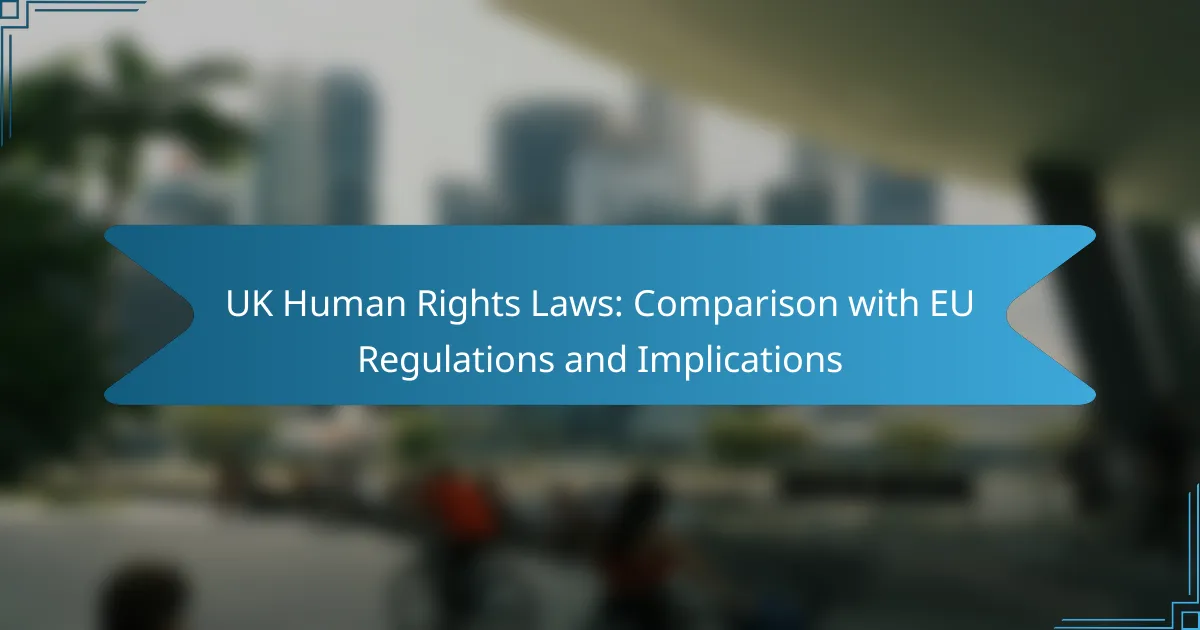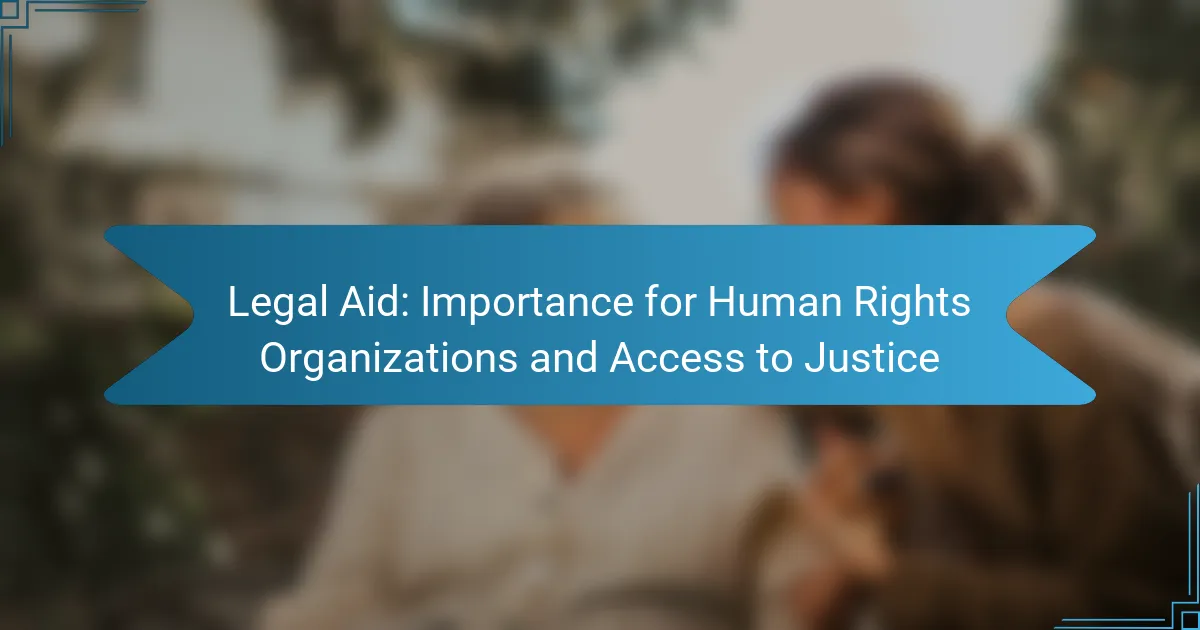The comparison between UK human rights laws and EU regulations reveals key differences in their legal frameworks, enforcement mechanisms, and scope. While the UK Human Rights Act 1998 integrates the European Convention on Human Rights, EU regulations cover a wider range of fundamental rights as outlined in the EU Charter of Fundamental Rights. The departure from the EU raises concerns about the potential loss of protections and the need for the UK to redefine its human rights landscape.
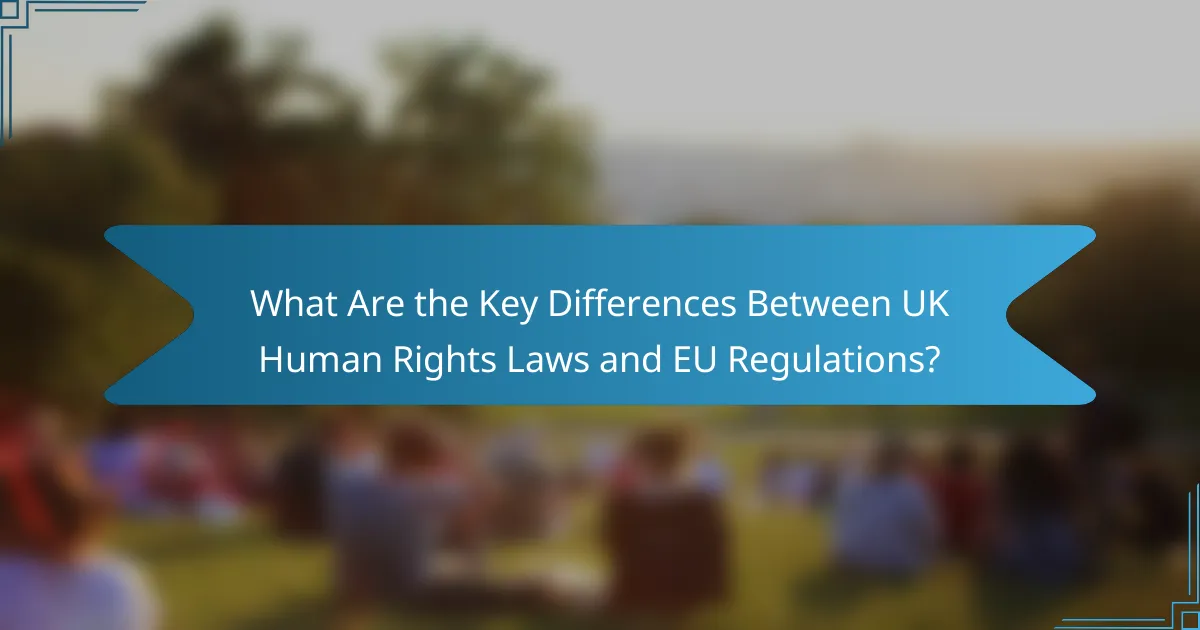
What Are the Key Differences Between UK Human Rights Laws and EU Regulations?
The key differences between UK human rights laws and EU regulations primarily lie in their legal frameworks, enforcement mechanisms, and scope of application. While the UK Human Rights Act 1998 incorporates the European Convention on Human Rights, EU regulations are broader and encompass various fundamental rights outlined in the EU Charter of Fundamental Rights.
UK Human Rights Act 1998
The UK Human Rights Act 1998 (HRA) enables individuals to seek justice for human rights violations in UK courts. It incorporates rights from the European Convention on Human Rights (ECHR), such as the right to life, prohibition of torture, and the right to a fair trial.
Under the HRA, public authorities must act in compliance with the ECHR, and individuals can challenge decisions made by these authorities. However, the Act does not create new rights but rather enforces existing ones within the UK legal framework.
EU Charter of Fundamental Rights
The EU Charter of Fundamental Rights is a binding document that outlines the fundamental rights protected within the European Union. It includes civil, political, economic, and social rights, such as the right to dignity, freedom of expression, and workers’ rights.
Unlike the HRA, the Charter applies to EU institutions and member states when implementing EU law, providing a broader scope of rights that can be enforced across the EU. This means that individuals can invoke these rights in cases involving EU legislation.
Scope of Application
The scope of application for the UK Human Rights Act is limited to the UK and its public authorities. It does not extend to private entities unless they are acting on behalf of the state.
In contrast, the EU Charter applies to all EU member states and their institutions when they are implementing EU law, which can lead to more extensive protections for individuals in cross-border situations.
Legal Enforcement Mechanisms
In the EU context, individuals can bring cases before the Court of Justice of the European Union (CJEU), which has the power to annul EU legislation that violates fundamental rights. This provides a stronger enforcement mechanism compared to the HRA.
Recent Amendments
Recent discussions in the UK have focused on potential amendments to the Human Rights Act, including proposals to limit the scope of rights or redefine the relationship with the ECHR. These changes could significantly impact how human rights are protected in the UK.
In the EU, the Charter has remained stable, but ongoing debates about the balance between security and individual rights continue to shape its interpretation and application across member states.
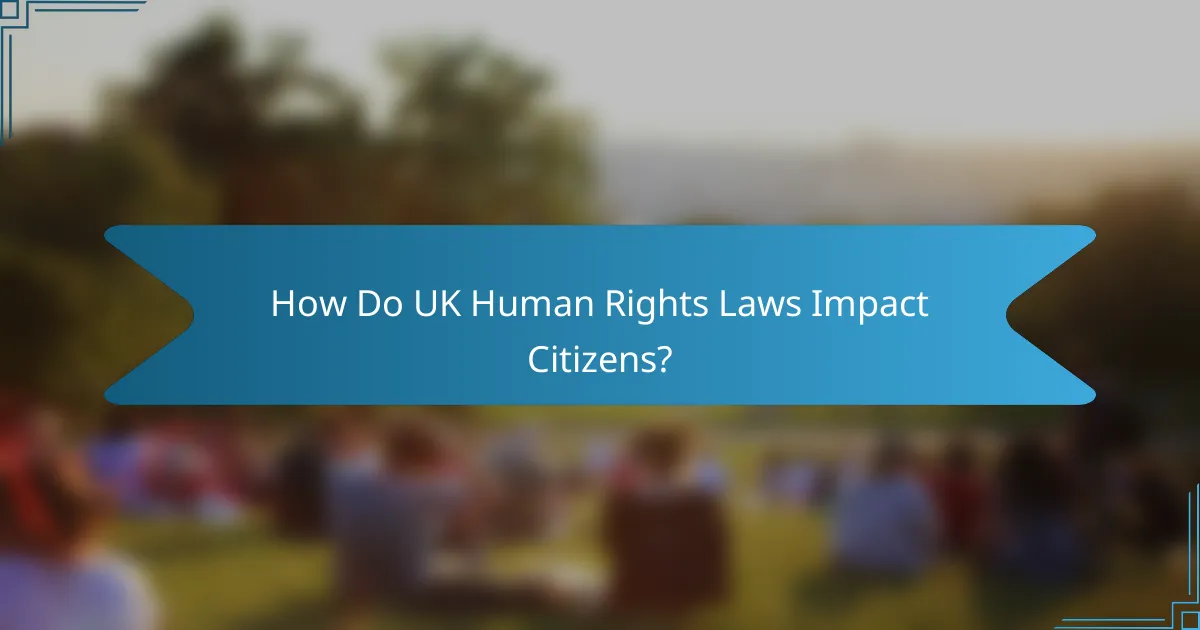
How Do UK Human Rights Laws Impact Citizens?
UK human rights laws significantly affect citizens by providing essential protections and ensuring accountability from public authorities. These laws, primarily derived from the Human Rights Act 1998, empower individuals to challenge violations and seek redress.
Protection of Individual Rights
The UK human rights framework safeguards various individual rights, including the right to life, freedom from torture, and the right to a fair trial. These protections ensure that citizens can live without fear of arbitrary treatment by the state or other entities.
For example, if a public authority unlawfully detains an individual, that person can invoke their rights under the Human Rights Act to seek compensation or challenge the detention in court. This legal recourse is vital for maintaining personal freedoms.
Access to Justice
Access to justice is a cornerstone of UK human rights laws, allowing citizens to pursue legal remedies when their rights are infringed. The legal system provides mechanisms for individuals to bring cases before courts, ensuring that justice is not just a privilege for the wealthy.
Legal aid is available for those who cannot afford representation, although funding has faced cuts in recent years. Citizens should be aware of their eligibility for legal aid and the processes involved in applying for it to ensure they can access justice effectively.
Public Sector Obligations
Public authorities in the UK have a duty to act in accordance with human rights laws, which means they must respect, protect, and fulfill the rights of individuals. This obligation extends to various sectors, including healthcare, education, and law enforcement.
For instance, a local council must ensure that its policies do not discriminate against any group and that services are accessible to all citizens. Failure to comply with these obligations can lead to legal challenges and potential compensation claims from affected individuals.

What Are the Implications of Leaving the EU on Human Rights?
Leaving the EU has significant implications for human rights in the UK, primarily through the loss of EU-enforced protections and potential legal uncertainties. The UK may need to navigate a new landscape of human rights legislation that could differ markedly from EU standards.
Loss of EU Protections
The UK’s departure from the EU means it no longer benefits from the Charter of Fundamental Rights, which provides a comprehensive framework for human rights. This loss could weaken protections against discrimination, privacy violations, and workers’ rights, as these areas were previously safeguarded by EU law.
For instance, the EU’s strict regulations on data protection, such as the General Data Protection Regulation (GDPR), may not be fully replicated in UK law, potentially leading to less robust privacy rights for individuals.
Potential Legal Gaps
Without EU oversight, there is a risk of legal gaps emerging in human rights protections. The UK may lack specific legal recourse for certain rights that were previously enforced at the EU level, leading to uncertainty for individuals seeking justice.
For example, areas like environmental rights and consumer protections could see diminished enforcement, as UK laws may not align with the comprehensive standards set by the EU. This could result in weaker legal frameworks that fail to address emerging human rights issues effectively.
Future Legislative Changes
The UK government may pursue legislative changes that could either enhance or diminish human rights protections. Future laws may be influenced by political priorities, potentially leading to a divergence from EU standards.
Stakeholders should monitor proposed legislation closely, as changes could impact various sectors, including healthcare, education, and employment. Engaging with advocacy groups can help individuals stay informed and influence policy decisions that affect human rights in the UK.
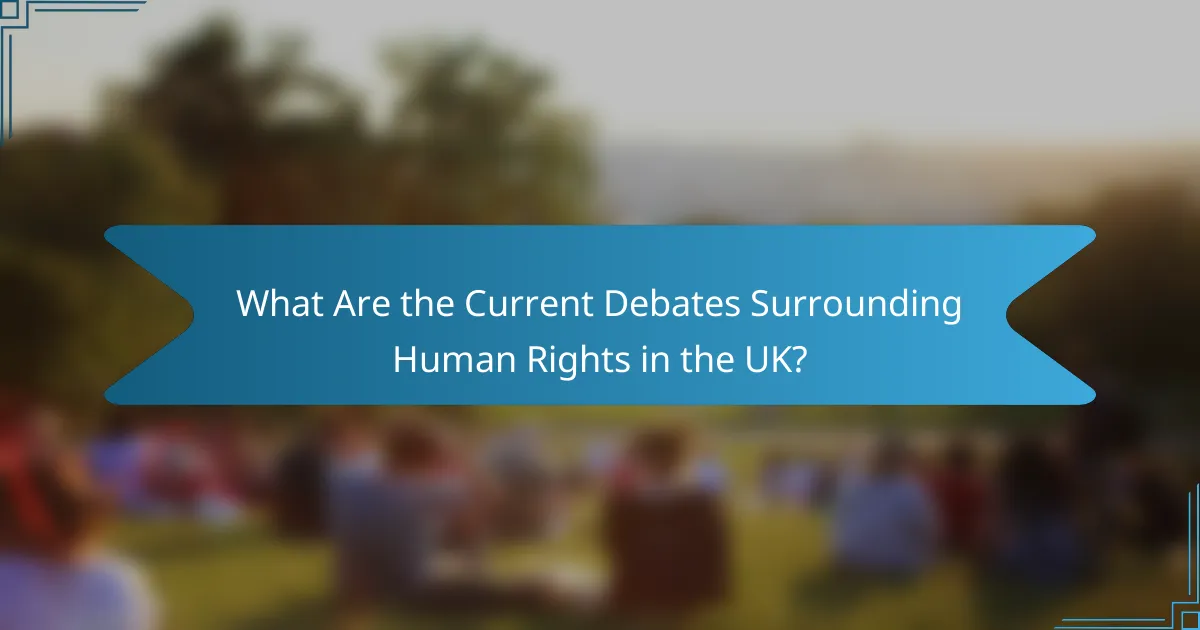
What Are the Current Debates Surrounding Human Rights in the UK?
The current debates surrounding human rights in the UK focus on the balance between individual rights and national security, the potential reform of the Human Rights Act, and the implications of Brexit. Discussions often center on whether existing laws adequately protect citizens or require updates to reflect contemporary values and challenges.
Government Proposals for Reform
The UK government has proposed reforms to the Human Rights Act, suggesting a shift towards a more limited interpretation of rights. These proposals include measures to restrict the ability of individuals to bring cases based on rights violations and to prioritize national security concerns over certain human rights protections.
Supporters argue that these changes are necessary to enhance public safety, while critics warn that they could undermine fundamental freedoms and weaken legal recourse for vulnerable populations. The outcome of these proposals could significantly reshape the landscape of human rights in the UK.
Public Opinion on Human Rights
Public opinion on human rights in the UK is divided, with some citizens advocating for stronger protections and others expressing concerns about the implications of such rights on law enforcement and national security. Polls indicate that a significant portion of the population believes that human rights laws should be re-evaluated to better serve the public interest.
Debates often reflect broader societal issues, including immigration and crime, influencing how human rights are perceived. Engaging the public in discussions about the importance and limits of human rights can help clarify these complex views.
Impact of Brexit on Human Rights Advocacy
Brexit has introduced uncertainty regarding the future of human rights in the UK, particularly concerning the relationship with European human rights laws. The UK’s departure from the EU raises questions about the applicability of the European Convention on Human Rights and the potential for divergence from EU standards.
This shift may embolden advocates for reform, who argue for a distinct British approach to human rights, while simultaneously raising alarms among those who fear a reduction in protections. The evolving legal landscape post-Brexit will likely influence both domestic and international human rights advocacy efforts.

What Frameworks Are Available for Comparing Human Rights Laws?
Comparing human rights laws involves examining various frameworks, including international treaties and national regulations. The key frameworks for this comparison include international human rights treaties and a comparative legal analysis of domestic laws in the UK and EU.
International Human Rights Treaties
International human rights treaties serve as foundational documents that establish standards for the protection of human rights globally. Key treaties include the Universal Declaration of Human Rights and the European Convention on Human Rights, both of which set benchmarks for member states.
The UK is a signatory to several of these treaties, which influence its domestic laws. Understanding how these treaties align or differ from EU regulations is crucial for assessing the overall human rights landscape.
Comparative Legal Analysis
Comparative legal analysis involves evaluating the differences and similarities between UK human rights laws and EU regulations. This analysis can highlight how each legal system addresses issues such as freedom of expression, the right to a fair trial, and protection against discrimination.
For instance, while both the UK and EU emphasize the protection of individual rights, the mechanisms for enforcement and the scope of certain rights may vary. Conducting this analysis can help identify potential gaps or strengths in each system, guiding policymakers and legal practitioners.
